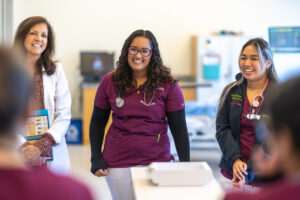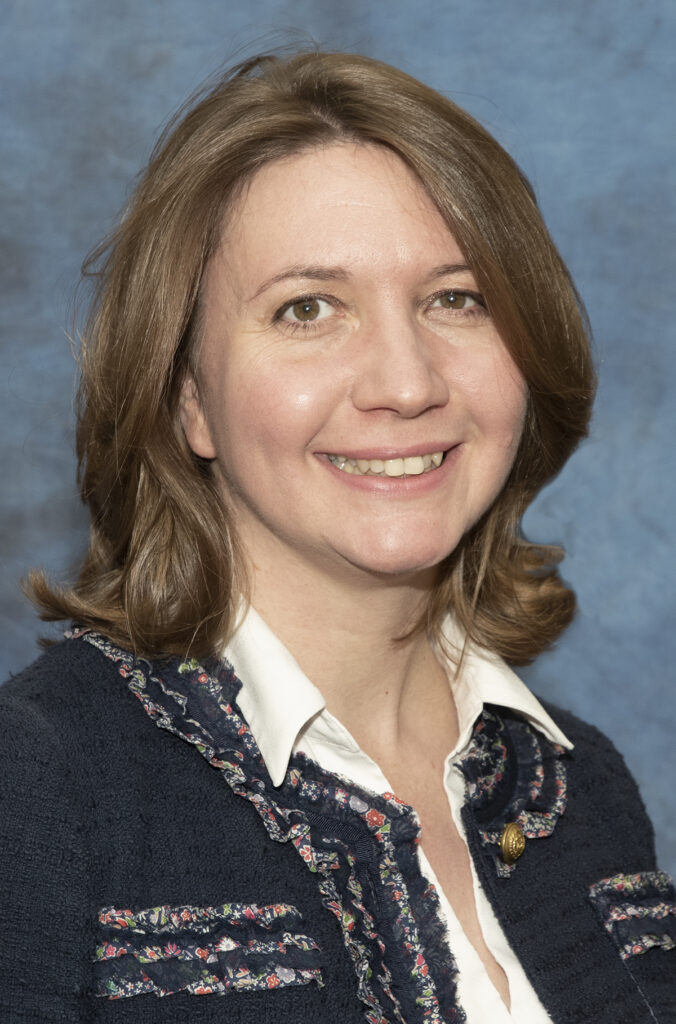- About Ramapo
- Academics
- Admissions & Aid
- Student Life
- Athletics
- Alumni
- Arts & Community
- Quick Links
- Apply
- Visit
- Give
National Accolades for the Certificate in Spanish for Healthcare and Human Services

December 9, 2024
by Liz Mendicino ’26
The National Humanities Alliance selected Ramapo College as one of only 12 schools highlighted in the 2024 report Attracting Students to the Liberal Arts Through Integrative Curricula for the Certificate in Spanish for Health Care and Human Services offered in the School of Humanities and Global Studies.

Dr. Santamaria-Laorden, professor of Spanish and director of the Spanish for Healthcare & Human Services certificate
Particular praise was given for the work of Ramapo College faculty, spearheaded by Dr. Natalia Santamaria-Laorden, professor of Spanish, for building a gateway program that leveraged Ramapo’s existing and robust support system for students such as the First-Year Seminar (FYS), the Equal Opportunity Fund (EOF) programs, and academic advisors. The FYS is a required course for first-year students that serves as an introduction to a liberal arts education with a wide variety of topics that demonstrate the interdisciplinary nature of a Ramapo College education. Santamaria-Laorden developed a section that introduces students to the certificate program. The team also partnered with the EOF office to expand access to the certificate program to students from disadvantaged educational backgrounds.
“I think when it comes to interdisciplinarity, we all need a whole lot of humility, you know, and it’s hard to practice,” said Santamaria-Laorden. “But on the other hand, I don’t think the current model serves any population. I want to emphasize that anything that is supposed to be for the bilingual population ends up benefiting the monolingual population too.” Santamaria-Laorden has been working with faculty both at Ramapo and universities abroad to help reshape the way Spanish is understood in the medical profession. Her work on the certificate program has resulted in several grant wins, a book which is utilized at several hundred institutions across the country, and greater outcomes for all students who participate.
The NHA report includes 12 in-depth case studies, one of which being Ramapo’s, and 20 brief profiles. The highlighted initiatives integrate the humanities, social sciences, and/or natural sciences with applied approaches and pre-professional training, helping to demonstrate the value of a broad-based education to students who may have a more skeptical view on an interdisciplinary education.
The interest from institutions across higher education is strong. More than 500 colleges and universities have expressed interest in adopting a similar program, and 36 have already adopted the program, thanks in part to the book Spanish for Health Care and Human Services: An Interdisciplinary Approach for Intermediate and Advanced Speakers co-authored by Santamaria-Laorden and Alicia Muñoz Sánchez, who manages Spanish instruction at the University of California at San Diego. Santamaria-Laorden also works with colleagues around the country to promote the value of integrative language programs.
The Spanish for Health Care and Human Services Certificate aims at developing students’ linguistic proficiency and cultural competency in Spanish so that they can operate professionally in a medical and human services setting with native speakers of the language. The courses in the certificate are designed to familiarize students with the intricacies of the language, especially false cognates, to make them effective translators and interpreters. This program creates more positive change than it seems on the surface. By enabling more students to enter the medical profession with a comprehensive understanding of the Spanish language, it doesn’t just help the patients, but the families of the patients as well.
“I think it’s really interesting how some of these practices still are not applied uniformly, and the fact that we have so many students who have gone through language brokering, which is when you translate for a family member,” said Santamaria-Laorden. “Imagine telling your mom she lost her kid, or your father that he has cancer, that really affects your development! And yet, even here at Ramapo you can listen to all these students talking about their experiences. Language brokering is a practice that should not be happening.”
Current students in good academic standing are automatically eligible for the Spanish for Health Care and Human Services Certificate, and should use the major/minor declaration form available through the Office of the Registrar to enroll in this program. Visiting and non-degree students are also welcome to apply for the program through the Office of Admissions.
To learn more about the certificate program and majors in the School of Humanities and Global Studies, visit ramapo.edu/hgs.
Copyright ©2025 Ramapo College Of New Jersey. Statements And Policies. Contact Webmaster.

Follow Ramapo